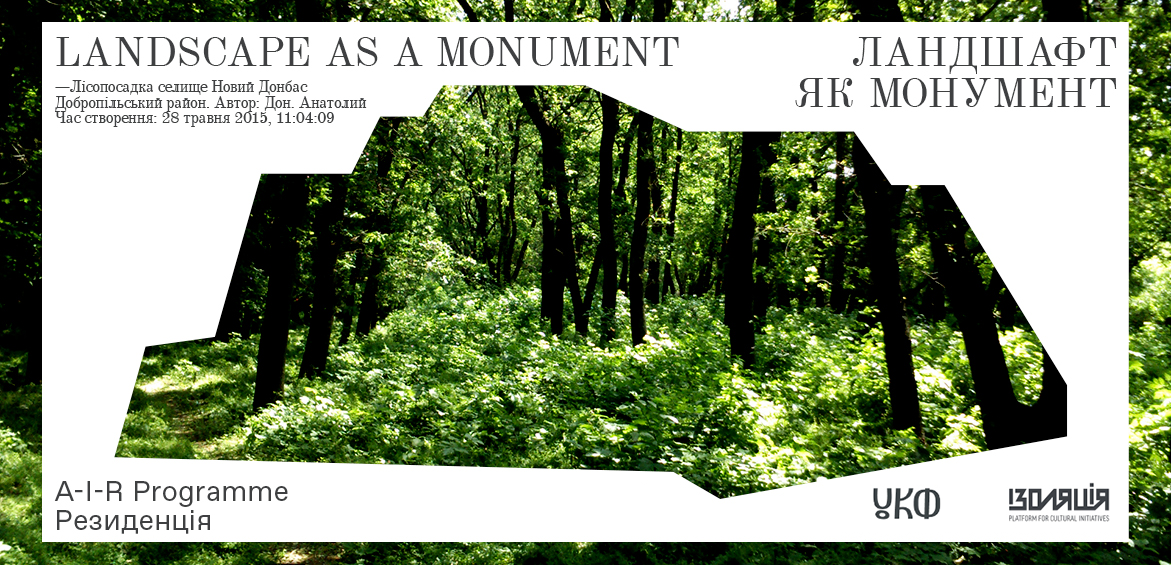Landscape As a Monument A-I-R Programme

3-23 August, 2020 IZOLYATSIA with support of Ukrainian Cultural Foundation will hold international online residency for artists, curators, researchers and activists Landscape As a Monument with particular focus on connections between contemporary art and ecology, politics and economy. The residence will be focused on revision of cultural landscapes, environmental history, human/nature dichotomy, industrial heritage and legacy.
The main themes are Anthropocene, cultural landscapes, (non)human, environment, ecological practices, environmental history, geology, evolution, object-oriented approach, displacement and history of migration, sustainable ecosystems, Donets Ridge, Donetsk coal basin, Ukraine, Soviet heritage, industry, modernization, decommunization, commemoration, memory, (non)institutional exhibition spaces, war and catastrophes.
Contributors: Anna Khvyl (UA), Pavlo Kovach (UA), Lesya Kulchynska (UA), Mariusz Czepczynski (PL), Andriy Vozyanov (BY), Jessica Zychowicz (US), Lia Dostlieva (UA/PL), Oleksandra Pohrebnyak (UA), Dmytro Chepurnyi (UA), Vitya Glushchenko (UA), Daryna Tsymbalyuk (UA/UK), Iryna Zamurayeva (UA/UK).
During the 19th and 20th centuries, the Eastern European steppe became a site of one of the most ambitious projects in the history of the region: the industrialization of the mineral-rich area on the left bank of the Dnipro river. Donets coal basin that turned into one of the largest industrial complexes of the Eastern Europe throughout the last two centuries, now faces the challenges of de-industrialization and military aggression. These events revealed geographical isolation and autonomy of the region, influenced and continue to influence the lives of 3.5 million people that used to live in these densely urbanized areas. However, the industrial complex around the coal basin coexists with steppes, Donets Ridge and Azov Sea. For a human they always served as recreational areas, yet beyond the human gaze they are an evolutionary environment, formed approximately 14 thousand years BC after melting of glaciers in the conditions of cold and windy arid mammoth steppe with barren vegetation.
Claire Colebrook in ‘The Intensity of the Archive’ points at the enlargement of archives in the age of Anthropocene, that includes not only texts that we can read, but also geological stratification of Earth. Steppe soil, plants, animals, clouds and minerals appear as actors that fill the environment with life. Tim Ingold in ‘Temporality of the Landscape’ suggests imagining the landscape as a continually unfolding story, defining this concept as dwelling perspective, that is suggesting to reconcile the separation between history and evolution. Observing a landscape is an act of memory. Our skin peels off from our bodies and turns into dust, carbon that we exhale grows into plants.
The attempt to equalize the opposition between man and landscape leads us to the conclusion that landscape is history that contains living memory of all of its dwellers. How will our perception of the environment change, if we bridge this gap? It is time to go out on the hills of Sviatohirsk and look around with a new gaze, and imagine beyond-human perspective. What will we see? Is this landscape a monument to industrial modernization and human activity? After all, can we coexist with it given the challenges of the climate crisis?
Structure
For the participants the residency will become a period of common work in four directions, reflected in the four labs: curatorial, visual, audial and gardening. The most of the communications and events within the framework of the program will take place online, however realization of the final projects, field research of the participants and individual scouting may take place in specific spaces. Interaction between the participants will be facilitated by mentors, who will provide support and moderation of the four labs, and help in realization of the final projects.
Online formats of the labs: slow reading and discussion of theoretical texts, discussions with mentors, workshops, silent parties, iterative work on individual and group projects etc.
Possible offline formats: walks on a safe distance, field work, excursions to industrial enterprises, individual meetings with representatives of the local cultural scene etc.
Visual Lab will be dedicated to work with the theme of the residency through the mediums of performance, installation, video, photo, design etc. Mentored by Pavlo Kovach, artist, member of the Open Group.
Audio Lab will develop experimental approaches to work with the environment through the methods of soundscape, audio walk, podcast, audial intervention, anthropology of sound. Mentored by Anna Khvyl, artist, DJ, curator of musical and educational programs.
Garden Lab will focus on (non)anthropocentric perspective on cohabitation with plants.Mentored by Lesya Kulchynska, cultural anthropologist, curator and art critic.
Curatorial Lab will be dedicated to work with (non)institutional spaces, research on curatorial practices in Ukraine and development of the final exhibition project in experimental format. The laboratory will be facilitated by Liya Dostleva and Alexandra Pogrebnyak.
The results of the residency are group and individual curatorial, research and art projects meant to provoke development of the discussion on correlation of contemporary culture and ecology, politics, economy and present new views on solutions of ecological problems. The participants of the residency will not only work on research of the local context through their practices, but also will have influence on the views of the involved communities on their own history, heritage, landscape and environment.
Expected that based on the results of the residency, 10 group and/or individual projects will be able to receive funding for implementation — 15,000 UAH for each project.
Project Team
Curators: Dmytro Chepurnyi — [email protected] and Oleksandra Pogrebnyak — [email protected]
Project management: Nina Tararueva — [email protected], Sofia Yukhimova — [email protected]
Design: Vitya Glushchenko — [email protected]
PR: Oleksandra Mayboroda — [email protected]
SMM: Kateryna Nesterenko — [email protected]